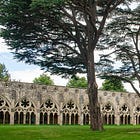Essays on the Catholic Church, theology, history and more.
About The WM Review
The WM Review is dedicated to serious Catholic research, historical analysis, and theological commentary. Our work is rooted in the perennial magisterium of the Holy Roman Catholic Church—outside of which there is no salvation.
We do not claim to have all the answers, but we strive to ask the right questions and point to trustworthy authorities from before this period of confusion.
What we publish
Theological analysis—examining the crisis in the Church with clarity and precision.
Commentary on the traditional Roman liturgy—understanding its significance and meaning.
Exclusive translations—important texts never before available in English.
Serious historical research—exploring key themes in the Church’s intellectual tradition.
Spiritual and devotional material—to help Catholics hold fast to the faith.
Who We Are
The WM Review edited by S.D. Wright and M.J. McCusker.
S.D. Wright holds a degree of M.St Theology from the University of Oxford.
M.J. McCusker holds a degree of MA History from the University of York.
We bring years of experience in serious research, historical analysis, and Catholic commentary. Our work is dedicated to strengthening what remains and equipping Catholics with the tools to navigate this unprecedented crisis in the Church.
Our Principles
We believe that God gave man the great gift of reason—to pursue, discover, and express truths about creation and divine revelation, as proposed by the Roman Catholic Church.
This commitment is expressed through:
Faithfulness to the traditional teachings of the Church.
Rigorous analysis of contemporary theological issues.
Providing access to sources and references that strengthen Catholic understanding.
Access & Support
The WM Review is free for readers. This is because we believe these ideas must reach as many people as possible.
However, we also provide WM+ articles—additional material for those who choose to support this work financially. This helps us continue producing serious Catholic research, while ensuring that the main body of material remains accessible for all.
We also offer our work freely to all clergy, religious, and seminarians upon request.
You can read what our readers and supporters have said of us here:
Further Information
Follow us here:
Twitter (The WM Review)
YouTube (The WM Review)
Telegram (The WM Review)
Twitter (The Father Coleridge Reader)
If you have the means, and want to support our aim to “Strengthen What Remains”, then consider becoming a monthly/annual subscriber to WM+ below:
You can also give us a one-time donation here:
Disclaimer
To paraphrase St Teresa of Avila:
We submit everything on this site to what is taught by Our Mother, the Holy Roman Church. If there is anything in it contrary to this, it will be without our knowledge. Therefore, for the love of Our Lord, we beg learned men to look at it very carefully, and to draw our attention to any faults of this nature, as well as to any other faults which will no doubt find their way into it.
Style Conventions
Some may find aspects of our style unusual. Here are some points to clarify.
We use British English at all times.
We usually refer to others with the title by which they are commonly known. Use of a surname without a title is a standard convention after the first mention, and as such carries no subtext or disrespect to the person.
We do not use reverential capitalisation of pronouns for God or his saints. This practice does not appear in Latin or in even quite recent English Catholic writings (for instance, the Douay-Rheims Bible). It seems to have been introduced or popularised by Protestants, although many Catholics have later adopted it. But it hardly seems credible to think that God is honoured by the arbitrary capitalisation of words, especially when this often confuses the flow of text, flattens typological references in the Old Testament, and has no clear place to stop (for example, some would extend this practice to relative pronouns such as “who”). Why not capitalise also the verbs that refer to God as subject? For this reason, we pursue a radically lower case convention wherever possible.
We welcome corrections of typographical errors.
Copyrighted Material
This web site may contain copyrighted material the use of which may not always have been specifically authorised by the copyright owner. If you claim the copyright to any material displayed or linked on this web site and would like for it to be removed, or if you believe that our use of it does not constitute “fair use” under U.S. Copyright Law as explained above, please send us a request for removal. We will endeavour to handle all requests promptly, at least within a week or less.





